Welcome to a newly minted newsletter! Under the hood, there has been a major change in how the layout is produced. Please send feedback about how it appears in your your mail reader. Your webmaster views it using Thunderbird, but your mileage may vary. Report any problems with how the layout appears to you. (There are glitches still to overcome, including updating the answer pages to match revised newsletter text.) Thanks!
 | TODAY IN SCIENCE HISTORY NEWSLETTER - 26 AUGUST |
| Feature for Today |
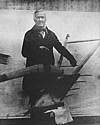 There are two McCormicks who made significant contributions to improving the methods of agriculture. On 26 Aug 1784, Stephen McCormick was born, the American inventor and manufacturer of a cast iron plow with detachable components. He introduced the concept of replaceable and standardized parts. He was the cousin of Cyrus McCormick who invented the famous reaper. There are two McCormicks who made significant contributions to improving the methods of agriculture. On 26 Aug 1784, Stephen McCormick was born, the American inventor and manufacturer of a cast iron plow with detachable components. He introduced the concept of replaceable and standardized parts. He was the cousin of Cyrus McCormick who invented the famous reaper. For a quick biography, read this article on Stephen McCormick, and cast your mind back to the conditions of farming, and the difficulty of taming arable land at the beginning of the nineteenth century. When plows attempted to turn over the sod, the ground fought back and damaged the plows. By the time McCormick got involved with addressing the problem, the wooden plows of earlier times had been replaced by cast iron. But there was still a problem to be solved regarding maintenace. Making parts replaceable through standardization — that was McCormick's important innovation. Eventually thousands of his horsedrawn plows were being manufactured. |
| Book of the Day | |
|
| Quotations for Today | |
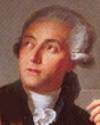 | The impossibility of separating the nomenclature of a science from the science itself, is owing to this, that every branch of physical science must consist of three things; the series of facts which are the objects of the science, the ideas which represent these facts, and the words by which these ideas are expressed. Like three impressions of the same seal, the word ought to produce the idea, and the idea to be a picture of the fact. |
| The self-same atoms which, chaotically dispersed, made the nebula, now, jammed and temporarily caught in peculiar positions, form our brains; and the 'evolution' of brains, if understood, would be simply the account of how the atoms came to be so caught and jammed. | |
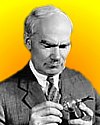 | Tiny ferryboats they were, each laden with its little electric charge, unloading their etheric cargo at the opposite electrode and retracing their journeyings, or caught by a cohesive force, building up little bridges, or trees with quaint and beautiful patterns. Describing the flow of electrons between electrodes in a vacuum tube. |
| Quiz | |
| Before you look at today's web page, see if you can answer some of these questions about the events that happened on this day. Some of the names are very familiar. Others will likely stump you. Tickle your curiosity with these questions, then check your answers on today's web page. | |
| Births | |
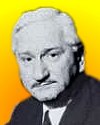 | Albert Bruce Sabin, born 26 Aug 1906 was a Polish-American physician and microbiologist best known for developing an oral vaccine (1955), which was administered to millions of children in Europe, Africa, and the Americas beginning in the late 1950s. For what disease was his vaccine developed? For what disease was his vaccine developed? |
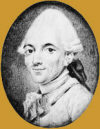 | Joseph-Michel, one of two brothers who were pioneers in ballooning, was born 26 Aug 1740. In the span of one year after releasing their test balloon, the brothers had enabled the first manned balloon flight in the world. What is the brothers' family name? What is the brothers' family name? |
 | On 26 Aug 1743, Antoine-Laurent Lavoisier was born a French scientist who is known as the “father of modern chemistry.” In 1778, he found that air consists of a mixture of two gases which he called oxygen and nitrogen. Lavoisier discovered the law of conservation of mass, and he also devised the modern method of naming compounds, which replaced the older nonsystematic method.  What ere the cirumstances of his death? What ere the cirumstances of his death? |
| Deaths | |
 | An aviator who was a WWI pilot (1902-1974) was the first to fly solo nonstop across the Atlantic Ocean, from New York to Paris, on 20-21 May 1927. Can you name this person? Can you name this person? |
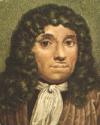 | A Dutch scientist, microscopist and zoologist (1632-1723) was the first to observe bacteria and protozoa. His researches on lower animals refuted the doctrine of spontaneous generation, and his observations helped lay the foundations for the sciences of bacteriology and protozoology.  Can you name this man? Can you name this man? |
| Events | |
On 26 Aug 1895, electricity was first transmitted commercially from the first large-scale utilization of hydroelectricity in the U.S.  What was the source of this water power? What was the source of this water power? | |
On 26 Aug until 28 Aug in 1883, the eruption of island volcano in the Dutch Indies produced violent explosions that destroyed two thirds of island and produced tidal waves as far away as Cape Horn, and possibly England. An estimated 36,000 died. What is the name of this volcano? What is the name of this volcano? | |
| Answers |
| When you have your answers ready to all the questions above, you'll find all the information to check them, and more, on the August 26 web page of Today in Science History. Or, try this link first for just the brief answers. Fast answers for the previous newsletter for August 25: Frederick Chapman Robbins = virologist; Sir Hans Adolf Krebs = Krebs cycle of the oxidation process within the cell; Theodor Kocher = thyroid gland • Antoine-Henri Becquerel • Uranus • Michael Faraday • thousands • decade of 1973 |
| Feedback |
 If you enjoy this newsletter, the website, or wish to offer encouragement or ideas, please send feedback by using your mail reader Reply button. If you enjoy this newsletter, the website, or wish to offer encouragement or ideas, please send feedback by using your mail reader Reply button. |
--
If you do not want to receive any more newsletters, Unsubscribe
To update your preferences and to unsubscribe visit this link


Δεν υπάρχουν σχόλια:
Δημοσίευση σχολίου